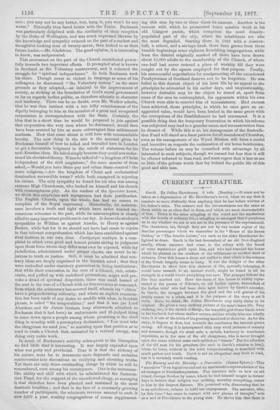CURRENT LITERATURE.
Garth. By Julian Hawthorne. 8 vols. (Bentley.)—It must not be taken as n depreciation of Mr. Hawthorne's novel, when we say that it reminds us more distinctly than anything that he has before written of his father's tales. The scenery and the circumstances are the same as those which we so often find in them, and which are most characteristic of him. There is the same mingling of the weird and the mysterious with the details of ordinary life, a mingling so managed that it perplexea us to say whether we are or are not in the presence of the supernatural. The characters, too, though they are not by any means copies of the familiar personages whom we remember in the " House of the Seven Gables," or "The Scarlet Letter," are such as the elder Hawthorne de- lighted to draw. Garth is the last descendant of an old New-England family, whose ancestor had come to the colony with the brand of some mysterious guilt upon him, and who had founded the house which he planted on the confines of the wilderness on another deed of violence. Over this house a doom not unlike to that which is the essence of the Greek tragedy seems to hang. It was the delight of the elder Hawthorne to show how this element of life, specially belonging, it would have seemed, to an ancient world, might be found in all it strength in a world where everything was new. The younger follows the line thus marked out. Here the doom of the house is visibly repre- sented in the person of Nikomis, an old Indian squaw, descendant of the Indian chief who had been slain ages before by Garth's ancestor. In Garth, the struggle between the good and the evil genius of his family comes to a crisis, and it is the purpose of the story to set it forth, Here, we think, Mr. Julian Hawthorne may fairly claim to be original. He gives a very striking picture of the man's inner life. Very striking, too, is the sketch of Madge, the beautiful girl whom Garth loves in his boyhood, but whose shallow nature, neither wholly false nor wholly true, it is one of the trials of his growing manhood to discover. As for the story, it lingers at first, but towards the conclusion the interest grows strong. All along it is interspersed with very vivid pictures of scenery and manners, though we must note a certain tendency to wearisome repetition, as in the ease of the old clergyman, who is never brought upon the scene without some such epithet as " titanic." But the affection of the old man for his grandson (for such is Garth's relation to him), whom he loves, without in the least comprehending, is described with much pathos and truth. Garth is not an altogether easy book to read, but it is certainly worth reading.






























 Previous page
Previous page